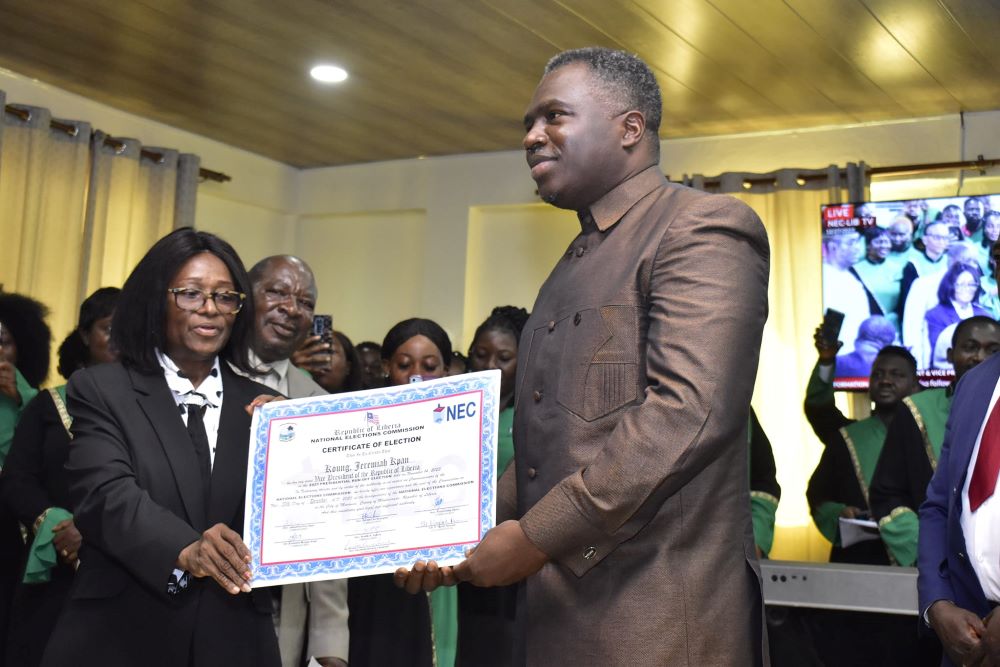The Rise of Jeremiah Koung: A Political Journey Guided by Senator Prince Y. Johnson
Vice President Jeremiah Koung’s political ascent is inextricably linked to the mentorship and guidance of the late Senator Prince Yormie Johnson (PYJ). Koung’s heartfelt tribute during Johnson’s state funeral revealed the depth of their relationship and Johnson’s instrumental role in shaping Koung’s political trajectory. Johnson, a controversial figure in Liberian politics, saw in Koung a potential successor and actively championed his rise within Nimba County and the national political scene.
Koung recounted a pivotal moment in 2010 when Johnson, in a phone call, urged him to prepare for the presidency. Initially dismissing it as a jest, Koung later realized the seriousness of Johnson’s intent. Subsequent conversations reinforced Johnson’s commitment to grooming Koung as his political heir, emphasizing the need for a strong Nimba leadership. Johnson’s plan involved stepping down as political leader of the Movement for Development and Reconstruction (MDR) party, allowing Koung to assume control and eventually contend for the presidency.
Despite his initial reservations and skepticism about Johnson’s unpredictable nature, Koung’s journey towards the presidency had begun. The senator’s public endorsement of Koung within Nimba County solidified his standing and signaled a transition of power. Johnson’s advancing age and previous unsuccessful presidential bids fueled his determination to see Koung succeed him.
The narrative takes a turn with the entry of Joseph N. Boakai, then former Vice President, into the political landscape. Boakai sought Koung’s support for his own presidential aspirations. Koung, demonstrating his loyalty to Johnson, consulted his mentor before making any commitments. Johnson, surprisingly pragmatic, advised Koung to support Boakai, paving the way for an unexpected alliance. Despite prior tensions between Johnson and Boakai, a reconciliation was orchestrated, leading to Johnson’s endorsement of the Boakai-Koung ticket.
While Koung’s support for Boakai was assured, the prospect of the vice presidency hadn’t been considered. Johnson, known for his directness, actively campaigned for Koung’s inclusion on the ticket, recognizing the strategic importance of having a Nimba representative in the highest echelons of power. He leveraged his influence and network within Nimba County, rallying support for Koung and ultimately securing his position as Boakai’s running mate.
Koung’s tribute to Johnson underscores the senator’s unwavering commitment to his political success. Despite the controversies surrounding Johnson’s past, his influence within Nimba County and his dedication to Koung’s rise are undeniable. The narrative portrays a complex relationship between mentor and protégé, highlighting Johnson’s strategic maneuvering and Koung’s eventual ascension to the second highest office in Liberia, a testament to Johnson’s political foresight and influence.
The story also reveals the intricate dynamics of Liberian politics, where alliances shift, reconciliations are brokered, and personal relationships play a crucial role in shaping the nation’s leadership. Johnson’s backing of Boakai, despite past animosity, exemplifies the pragmatic nature of political maneuvering, while his unwavering support for Koung highlights the enduring impact of mentorship and loyalty. Koung’s emotional tribute offers a glimpse into the personal bonds that underpin political partnerships, revealing the human element behind the strategic calculations and power plays.














